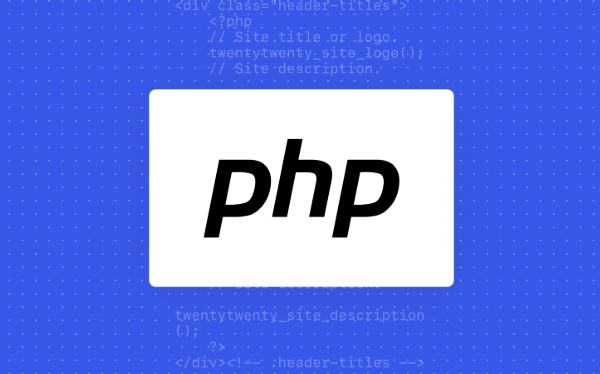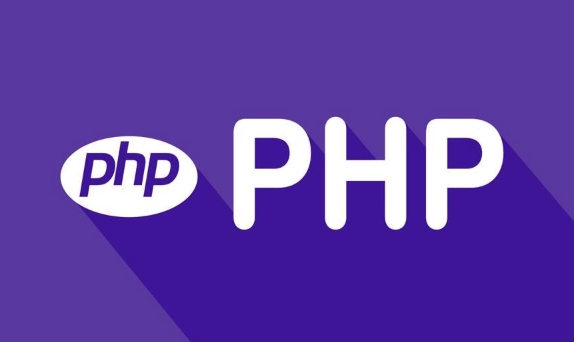Modernizing Your Classes with PHP Typed Properties
Jul 26, 2025 am 09:49 AMTyped properties in PHP 7.4 allow direct type declaration for class properties, improving reliability, IDE support, and code clarity; 2. They enforce type safety, reduce bugs, enable better autocompletion, and minimize constructor checks; 3. To migrate, use existing @var docblocks to add types, apply nullable or mixed as needed, ensure proper initialization, and adopt promoted properties in PHP 8.0 ; 4. Best practices include using declare(strict_types=1), preferring specific types, initializing properties, and avoiding forced typing on dynamic data—modern PHP development should embrace typed properties for robust, maintainable code.

PHP’s introduction of typed properties in PHP 7.4 was a game-changer for writing clean, reliable, and self-documenting object-oriented code. If you're still using PHP classes with untyped properties and relying solely on docblocks or runtime checks, it's time to modernize. Here's how typed properties can improve your classes and how to adopt them effectively.

What Are Typed Properties?
Typed properties let you declare the data type of a class property directly in the property declaration. Before PHP 7.4, you could only type-hint parameters and return values — not properties.
Before (PHP

class User
{
/** @var string */
public $name;
/** @var int */
public $age;
}After (PHP 7.4 ):
class User
{
public string $name;
public int $age;
}This enforces type safety at the property level — PHP will throw a TypeError if you try to assign a value of the wrong type.

Benefits of Using Typed Properties
1. Improved Code Reliability
With typed properties, invalid data assignments fail early and loudly. This reduces bugs caused by incorrect types sneaking into your objects.
$user = new User(); $user->age = "not a number"; // TypeError: Cannot assign string to int
2. Better IDE Support and Autocompletion
IDEs can now understand your property types natively, without relying on @var docblocks. This means better autocompletion, refactoring, and inline error detection.
3. Self-Documenting Code
Types are part of the code, not just comments. Anyone reading your class immediately knows what each property should contain.
4. Reduced Need for Constructor Type Checks
You no longer need to validate types in constructors as rigorously — the property itself handles basic enforcement.
class Product
{
public string $title;
public float $price;
public function __construct(string $title, float $price)
{
$this->title = $title;
$this->price = $price;
// No manual type checks needed!
}
}How to Migrate Legacy Classes
Upgrading older classes is straightforward but requires attention to detail.
Step-by-step migration:
- Review existing docblocks for
@varhints — these are your guide for typing. - Add types to properties where the type is consistent and well-defined.
- Use nullable types when a property can be
null:public ?string $email = null;
- Be cautious with mixed or dynamic data — if a property truly holds multiple types, consider redesigning or use
mixed(PHP 8.0 ):public mixed $metadata = null;
Watch out for:
- Default values: You must initialize nullable or non-nullable properties appropriately.
public string $status = ''; // OK public string $name; // Error unless initialized in constructor
- Promoted properties (PHP 8.0 ): Combine constructor parameters and property assignment with type safety:
class User { public function __construct( public string $name, public int $age ) {} }
Best Practices
? Use strict types at the top of your files:
declare(strict_types=1);
This ensures consistent type checking across your codebase.
? Prefer specific types over
mixed— only usemixedorobjectwhen absolutely necessary.? Initialize properties or ensure they’re set in
__construct()to avoid uninitialized value errors.? Don’t force types where the data is genuinely dynamic — consider encapsulating that logic instead.
Modernizing your classes with typed properties isn’t just about using new syntax — it’s about building more robust, maintainable applications. The combination of early error detection, better tooling, and clearer intent makes typed properties a must-use feature in modern PHP.
Basically, if you're on PHP 7.4 or higher, there's little reason not to use them.
The above is the detailed content of Modernizing Your Classes with PHP Typed Properties. For more information, please follow other related articles on the PHP Chinese website!

Hot AI Tools

Undress AI Tool
Undress images for free

Undresser.AI Undress
AI-powered app for creating realistic nude photos

AI Clothes Remover
Online AI tool for removing clothes from photos.

Clothoff.io
AI clothes remover

Video Face Swap
Swap faces in any video effortlessly with our completely free AI face swap tool!

Hot Article

Hot Tools

Notepad++7.3.1
Easy-to-use and free code editor

SublimeText3 Chinese version
Chinese version, very easy to use

Zend Studio 13.0.1
Powerful PHP integrated development environment

Dreamweaver CS6
Visual web development tools

SublimeText3 Mac version
God-level code editing software (SublimeText3)

Hot Topics
 Passing Variables by Reference vs. By Value in Functions
Jul 26, 2025 am 09:49 AM
Passing Variables by Reference vs. By Value in Functions
Jul 26, 2025 am 09:49 AM
Passbyvaluemeansacopyofthedataispassed,sochangesinsidethefunctiondonotaffecttheoriginalvariable,asseeninCwithprimitivesorPythonwithimmutabletypes.2.Passbyreferencemeansthefunctionreceivesadirectreferencetotheoriginal,somodificationsinsidethefunctiona
 The Lifecycle of a PHP Variable: From Allocation to Garbage Collection
Jul 24, 2025 pm 10:49 PM
The Lifecycle of a PHP Variable: From Allocation to Garbage Collection
Jul 24, 2025 pm 10:49 PM
APHPvariable'slifecyclebeginswithmemoryallocationviazvalcreation,whichstoresthevalue,type,referencecount,andreferenceflag.2.Whenvariablesareassignedorshared,PHPusesreferencecountingandcopy-on-writetooptimizememoryusage,onlyduplicatingdatawhennecessar
 The Case Against the `global` Keyword: Strategies for Cleaner Code
Jul 25, 2025 am 11:36 AM
The Case Against the `global` Keyword: Strategies for Cleaner Code
Jul 25, 2025 am 11:36 AM
Avoidusingtheglobalkeywordunnecessarilyasitleadstocodethatishardertotest,debug,andmaintain;instead,usefunctionparametersandreturnvaluestopassdataexplicitly.2.Replaceglobalvariableswithpurefunctionsthatdependonlyontheirinputsandproduceoutputswithoutsi
 Modernizing Your Classes with PHP Typed Properties
Jul 26, 2025 am 09:49 AM
Modernizing Your Classes with PHP Typed Properties
Jul 26, 2025 am 09:49 AM
TypedpropertiesinPHP7.4 allowdirecttypedeclarationforclassproperties,improvingreliability,IDEsupport,andcodeclarity;2.Theyenforcetypesafety,reducebugs,enablebetterautocompletion,andminimizeconstructorchecks;3.Tomigrate,useexisting@vardocblockstoaddty
 A Deep Dive into PHP Superglobals: Beyond `$_GET` and `$_POST`
Jul 26, 2025 am 09:41 AM
A Deep Dive into PHP Superglobals: Beyond `$_GET` and `$_POST`
Jul 26, 2025 am 09:41 AM
PHPsuperglobalsinclude$_GET,$_POST,$_REQUEST,$_SESSION,$_COOKIE,$_SERVER,$_FILES,$_ENV,and$GLOBALS,eachservingdistinctpurposesbeyondjusthandlingformdata;theyenablestatemanagement,serverinteraction,andenvironmentaccess.1.$_REQUESTcombines$_GET,$_POST,
 Demystifying PHP's Variable Variables (`$$var`)
Jul 25, 2025 am 04:42 AM
Demystifying PHP's Variable Variables (`$$var`)
Jul 25, 2025 am 04:42 AM
Variable variables use the value of one variable as the name of another variable through the $$var syntax; 2. For example, when $myVar is "hello", $$myVar is equivalent to $hello and can be assigned a value; 3. In practical applications, it can be used to dynamically process form data, such as traversing $_POST with foreach and creating corresponding variables with $$key; 4. There are problems such as poor readability, high security risks, and disrupting static analysis, especially avoiding the use of $$ for user input; 5. It is recommended to use arrays or objects instead of creating dynamic variables, such as storing data into $data array instead of creating dynamic variables; 6. Using ${$var} curly brace syntax can improve code clarity, especially in complex scenarios. Variable change
 PHP Constants vs. Variables: A Guide to Immutability
Jul 25, 2025 pm 05:37 PM
PHP Constants vs. Variables: A Guide to Immutability
Jul 25, 2025 pm 05:37 PM
Constantscannotbechangedafterdefinition,whilevariablescan;1.Variablesstartwith$,aremutable,scoped,andidealfordynamicdata;2.Constantsusedefine()orconst,haveno$,areimmutable,globallyscoped,andbestforfixedvalueslikeconfiguration;3.Useconstantsforunchang
 The Nuances of `isset()`, `empty()`, and `is_null()` for Variable Validation
Jul 24, 2025 pm 10:15 PM
The Nuances of `isset()`, `empty()`, and `is_null()` for Variable Validation
Jul 24, 2025 pm 10:15 PM
isset()checksifavariableisdeclaredandnotnull,returningtrueforemptystrings,0,'0',false,andemptyarrays;useittoconfirmavariableexistsandhasbeenset,suchasverifyingforminputslike$_POST['email'].2.empty()determinesifavalueis"empty"inauser-logicse






